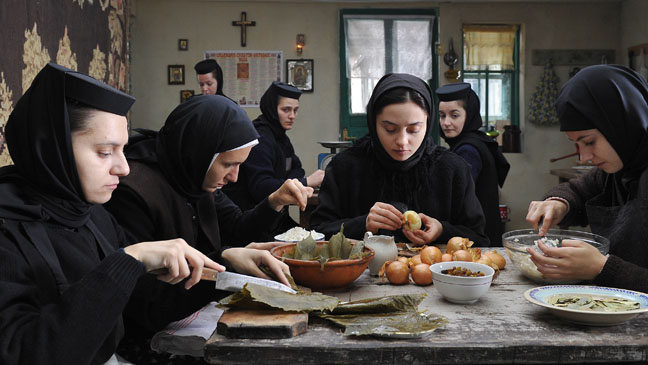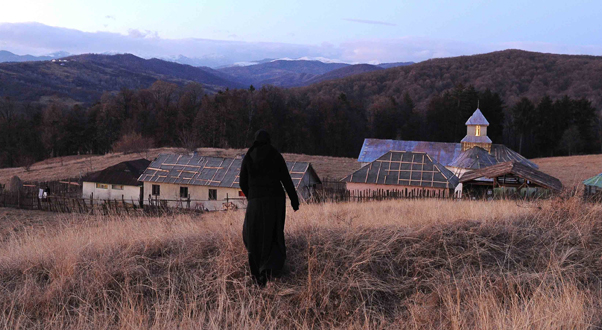|
In
2005 a Romanian nun was bound and gagged and tied to a makeshift cross.
She was
dehydrated, starved and suffocated for three days until she died. The
people in
the Romanian village of Tanacu who had imprisoned and murdered
twenty-three
year old Irina Maricica Cornici were a monk and four other nuns
belonging to
the Orthodox Church. They had been attempting to perform an exorcism on
Irina
because they believed that she had been possessed by the devil. She was
previously diagnosed by a hospital as suffering from schizophrenia. Two
years
later, the priest was sentenced to fourteen years in prison.
Romanian
filmmaker Cristian Mungiu (4 Months, 3
Weeks and 2 Days) has written a friendship of two girls around
these
events, while still treating the case with accuracy and tact. He has
stated
that he wanted to make a film about the passivity of the world and to
encourage
people to have an opinion, rather than merely accepting daily habits as
inconsequential. He has also said that he didn't want the film to be
made of
goodies and baddies. The natural performances from several first time
actors
sidestep the trap of simplicity. The film is a critique of the dangers
of segregated
communities. It is not an anti-religious film but one that displays the
incompatibility of the values of the inner and outside world. Where do
we stand
once we realise both are as oppressive and doomed as each other?

In
their first feature roles Cristina Flutur and Cosmina Stratan play
Alina and
Voichita, two girls who used to live in an orphanage but were
separated. Alina
returns from Germany to visit Voichita who is now living in a convent
as a nun.
They used to belong to each other but Voichita declares that she Alina
in a
different way now and that her heart is strictly with God. The convent
they are
staying in has no electricity and supposedly no regard for money
either. It
relies on manual labour from the other nuns and also the head priest
(Valeriu
Andriuta). The regime is strict because the priest has little patience
for any
scandals and the rules are dogmatic. Chaos erupts when the other girls
claim
that Alina tried to hurt herself and began attacking people and she has
to be
taken to hospital.
Mungiu
has a staggering eye for detail and great patience for visualising
spatiality. Using
clear handheld cameras, many scenes are filmed in long, single takes
and the
duration of the shots shows the containment of the spatiality of the
nuns'
lives and the remoteness of the community. The effect of static
formalism is
that it infers their lack of consciousness about the outside world and
modern
sensibilities and values. Similarly, a wide angle shot from the top of
the hill
expresses the physical and mental distance between the Church and the
rest of
the society. Subtle contrasts in costumes, including the black robes of
the
nuns juxtaposed again Alina's Rebook tracksuit top further visualise
the
conflict of the two worlds and their values.

Personalising
the notion of the spiritual pitched against the modern world are the
relationships of the girls. Alina and Voichita's conversations are a
binary
forged between two contrasting ideas of love: those who believe in the
tangible
and physical meaning and spiritual satisfaction through prayer and
dedication
only to God. Voichita confesses her faith to Alina: "I've got someone
else
in my soul now". Both performances are pitched with a quiet naturalism
that prevents their immensely convincing work from straying into
caricatures. Voichita
and the priest aren't portrayed as villains but as people who are
unfamiliar
with the outside world and unshakable in their faith because this is
how
they've been conditioned and how they discipline themselves.
One
final image in the film fascinates but also reveals some limitations.
It is the
sight from the police car of a modern world that is loud, unruly and
disrespecting of the law. How would some of these characters respond in
the
outside world? Is there any hope that they will adapt to the modern
world when
they are taken to gaol and have to come to terms with the boundaries of
modern
society? By working strictly in the frame of the real events, thorough
character development isn't on Mungiu's mind. He ends the film with a
brilliantly provocative note but one that is also verging closely on
unsalvageable nihilism for humanity.
|